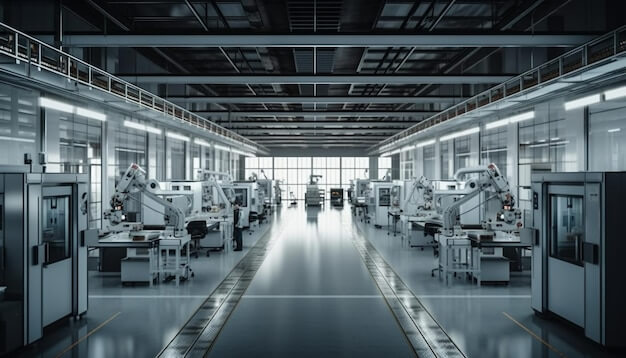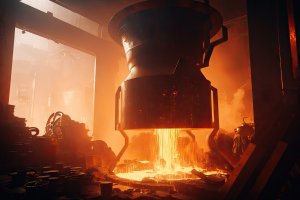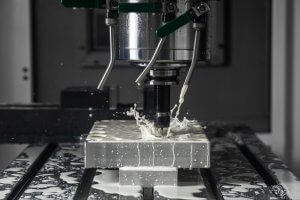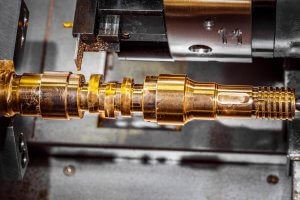The Role of Superalloys in CNC Machining
Computer Numerical Control (CNC) machining is a modern manufacturing process where pre-programmed computer software dictates the movements of factory tools and machinery. An essential facet of this procedure is the use of superalloys, metal mixtures designed for high strength and resistance to wear, corrosion, and heat. These alloys are pivotal for parts exposed to severe temperatures and corrosive environments, making them invaluable within industries such as aerospace and chemical processing. Inconel 718 and Hastelloy C-276 are two notable examples of superalloys often used.
- Inconel 718 exhibits exceptional tensile, fatigue, creep, and rupture strength at high temperatures, thus it’s frequently employed in jet engines and gas turbines.
- Hastelloy C-276, on the other hand, carries an immense resistance to a wide array of hostile environments, including wet chlorine gas and acids – lending its usefulness primarily to chemical applications.
Indeed, their tailored properties suitably empower these superalloys to withstand the intense conditions present in CNC machining processes, thereby enhancing operational efficiency and product longevity.
Understanding Superalloys: Inconel 718 and Hastelloy C-276
Superalloys, including Inconel 718 and Hastelloy C-276, are distinguished by their superior heat resistance abilities due to the metallurgical nature of their alloy compounds. Specifically, nickel-chromium based superalloy Inconel 718 is extensively utilized in industries such as aerospace for its high-tensile strength, excellent fabricability, and remarkable corrosion resistance even at extreme temperatures up to 1300°F (704°C). Additionally, it shows notable fatigue, creep behavior under repeated stress conditions at elevated temperatures.
On the other hand, Hastelloy C-276 belongs to the family of nickel-molybdenum alloys and offers considerable advantages including strong resistance to pitting, crevice-corrosion and stress-corrosion cracking alongside high thermal stability below 1022°F (550°C) that outlasts severe chemical environments, hence used for processing equipment in chemical plants where presence of aggressive chemicals is common.
Role of Superalloys in Modern CNC Machines
In modern Computer Numerical Control (CNC) machining, superalloys such as Inconel 718 and Hastelloy C-276 are indispensable for their unique properties that directly affect manufacturing precision and capability. Superalloys exhibit exceptional mechanical strength, resistance to thermal creep deformation, stability under extreme heat, and resistance to corrosion or oxidation. Thus, they play a critical role in CNC machining where precision, durability, and resilience are crucial.
- Mechanical Strength: The high-strength property of superalloys like Inconel 718 and Hastelloy C-276 allows them to withstand hefty pressures while maintaining form and integrity, hence ensuring precision even with rugged use.
- Resistance to Thermal Creep Deformation: Superalloys possess excellent creep resistance which equips the CNC machines to operate at high temperatures without undergoing dimensional changes. That is particularly important in maintaining consistent production quality.
- Thermal Stability: Given the high-speed nature of CNC machining, significant heat gets produced. However, given the superalloys’ stability under fairly high heat conditions, it permits the machine to function continuously without causing damage due to overheating.
- Corrosion/Oxidation Resistance: Being resistant against corrosion and oxidation means longevity and less maintenance for the CNC machinery. This property also contributes to accurate performance as the parts will not wear out quickly.
To sum up, the vast impact on the capabilities and efficiency of a CNC workstation by using these superalloys cannot be overstated. For instance, aerospace industries rely on the durable and resilient characteristics of these materials for complex and precise component manufacturing. Therefore, the key principles of mechanical strength, thermal stability and resistance (both to creep deformation and corrosion) make superalloys an integral part in enhancing the performance of modern CNC operations.
Comparison between Inconel 718 & Hastelloy C-276
Inconel 718 and Hastelloy C-276 are both high-performance superalloys with exceptional corrosion resistance and mechanical properties. They are commonly used in demanding applications such as aerospace, chemical processing, and marine environments due to their ability to withstand extreme conditions.
Common Challenges and Strategies in Working with Inconel 718 and Hastelloy C-276 Alloys
In the process of executing modern CNC machining operations, working with superalloys like Inconel 718 and Hastelloy C-276 often presents certain challenges. One common issue experienced by manufacturers is the excessive tool wear resulting from these alloys’ extreme strength and high temperature resistance. Overcoming this involves choosing robust tools that can withstand such conditions or adopting innovative tool path strategies to minimize unnecessary friction.
Additionally, these materials’ unique thermal properties can lead to material deformation if not controlled properly. Thus implementing cooling measures during the machining process becomes essential. Furthermore, their inherent hardness necessitates slower-cutting speed which may impact production timelines adversely.
- Tip 1:Selecting premium quality cutting tools designed for high-strength materials could help reduce tool wear.
- Tip 2: Integrating a technically advanced cooling system into the machining process will control thermal distortions effectively.
- Tip 3: Optimizing the cutting speed considering the material’s hardness, without compromising on quality, would enhance efficiency.
Lastly, despite these difficulties associated with working with Inconel 718 and Hastelloy C-276, there are ways to optimize the CNC machining processes using pre-planning methods and technological advancement that focus on improving production rates while maintaining product quality.
Conclusion: Comparing Inconel 718 and Hastelloy C-276 in Modern CNC Machining
The ultimate choice between superalloys Inconel 718 and Hastelloy C-276 is pivotal in modern Computer Numerical Control (CNC) machining. Both alloys serve distinct functions, with the former renowned for exceptional mechanical strength and corrosion resistance even at high temperatures, making it suitable for jet engines and gas turbines. On the other hand, Hastelloy C-276 exhibits an outstanding ability to combat localized corrosion such as pitting, rendering it vital in harsh industrial environments like waste treatment.
- Inconel 718:
- Prime for high strength applications requiring resistance to extreme heat.
- Ideal use case includes: aerospace operations.
- Hastelloy C-276:
- Excellent against localized corrosion, e.g., pitting or crevice corrosion.
- Main application exists within rigorous industries like waste treatment facilities.
Making an informed decision based on these technical principles can significantly enhance the efficiency, longevity, and cost-effectiveness of your CNC processes, thus underlining the importance of accurate choice in superalloys.
Related Posts
- Inconel vs. Monel for CNC Machining: A Comprehensive Material Comparison
CNC Machining and Material Importance in Manufacturing Computer Numerical Control (CNC) machining is a manufacturing process that leverages computers to control machine tools including lathes, mills and grinders among others.…
- The Advantages of Using Superalloys in High-Temperature CNC Machining Environments
Introduction to Superalloys and High-Temperature CNC Machining A significant advancement in the field of metallurgy is the development of superalloys, a class of high-performance materials characterized by excellent mechanical strength…
- The Role of Precision in CNC Machining: How Tight Tolerances Impact Cost and Quality?
Introduction: Understanding Precision in CNC Machining In manufacturing contexts, precision is epitomized by Computer Numerical Control (CNC) machining. In essence, CNC machining is a process utilized widely within the manufacturing…








